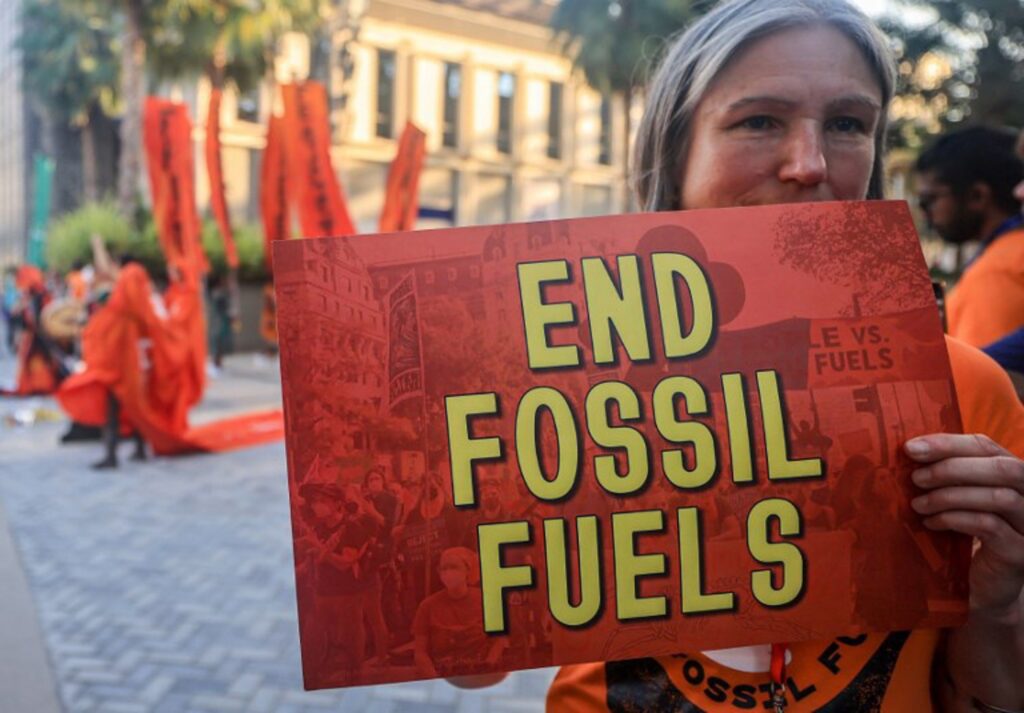The Climate Change Conference (COP28) had a promising start in Dubai on 30 November, with a swift decision to set up a fund for the climate losses and damages of the most vulnerable countries.
However, old patterns soon emerged at the annual climate conference, with lengthy discussions, dubious posturing, turbulent negotiations and divisions between ‘Northern’ and ‘Southern’ countries. Central to the discussions at this mid-point is the future of fossil fuels worldwide.
"What we have achieved collectively in one week is nothing short of historic," commented COP28 President Sultan Al Jaber on Wednesday. Notably, this is the first time substantive decisions have been made at the start of the conference, he reminded. Al Jaber, who also heads UAE’s leading oil group Adnoc, has been attracting attention with his statements throughout the conference.
Through a series of ambiguous remarks about the termination of fossil fuels, Al Jaber has created doubts and confusion about his genuine convictions. Observers are divided if this is possibly a clever strategy to coax oil-rich countries towards fossil fuel alternatives, or a significant misstep that reveals a waning leadership.
Climate results?
Whatever happens, COP28 will nevertheless be able to boast a number of achievements. In the wake of its creation, the new fund for climate damage in vulnerable countries has so far attracted more than 720 million dollars in pledges, mainly from European countries, but also from the United Arab Emirates (100 million USD), hosts of this COP28. But this is a drop in the ocean compared with the needs in this area, estimated at hundreds of billions of dollars a year, according to NGOs.
COP28 has also drafted 11 diverse initiatives and statements on various aspects of combating global warming during its first week. Notably, 124 countries, including Belgium, committed to tripling their renewable energy capabilities and doubling their energy efficiency by 2030.
COP28 aims to conclude with a first-ever ‘global stocktake’, a worldwide exercise as stipulated by the Paris Climate Agreement.
The renowned report captures the reality that the commitments made by the nearly 200 signatories of the Paris Agreement are insufficient to curb global warming. If no further policy changes are instituted, the world is on course for a rise in global temperature of over 2.5°C by the end of the century, far above the Paris Agreement’s goal of limiting global warming well below 2°C.
The global stocktake exercise is expected to give rise to new commitments from countries, more binding for 2025.
The final verdict is expected to be keenly watched, as the adopted text would indicate whether the world is moving towards countering the use of fossil fuels. IPCC reports highlight that limiting global warming to 1.5°C requires alomost halving greenhouse gas emissions by 2030.
Smokescreens
The draft text in negotiation features varying degrees of disengagement from fossil fuels, ranging from ambitious to cautious.
The fate of carbon capture and sequestration (CCS) technology in the agreement is also under debate. While the European Union favours restricting the use of these technologies to industries difficult to decarbonise, some oil-rich countries are accused of using it as a smokescreen to prolong the use of fossil fuels.
By 12 December, COP28 aims to reach agreements on other key areas of climate action: climate finance to Southern countries; work programme on ‘just transition’; mitigation work programme; aligning financial flows to the goals of the Paris Agreement; a clear global target for adaptation to climate change.
To achieve this, the Emirati President has urged parties "to step outside their comfort zones" as negotiations will start at ministerial level from Friday. He also hopes to complete COP28 no later than 11 am on 12 December, a feat given that climate conferences are often notorious for overruns.

